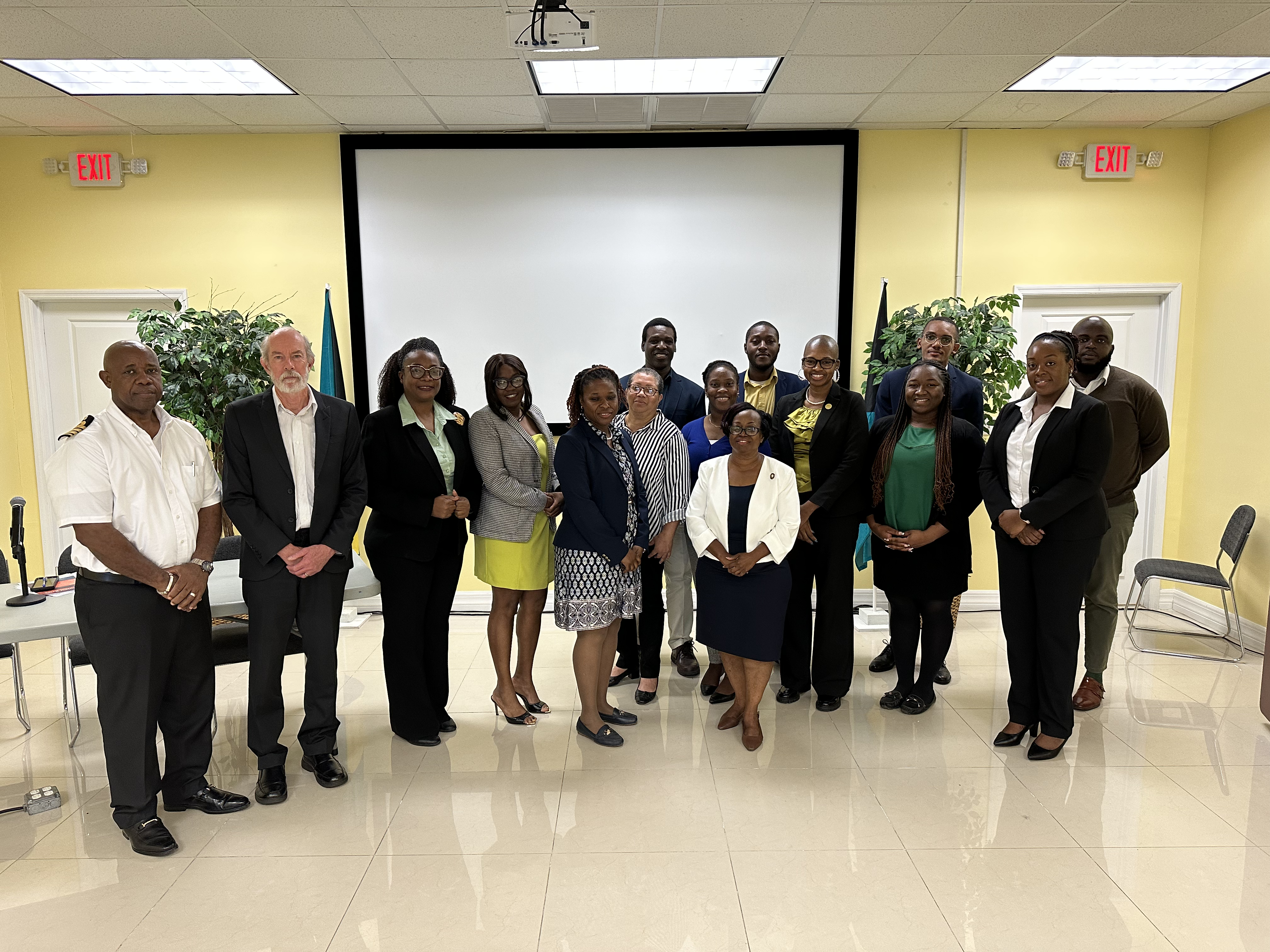This blog post was developed summarising the intervention of The Bahamas on the Global Green Growth Knowledge Partnership (GGKP) roundtable Inside the POPs Inventory: Lessons, Challenges and Successes from the Global NIP Update held on 14 April 2025.
The Bahamas is currently in the midst of updating its National Implementation Plan (NIP) under the Stockholm Convention on Persistent Organic Pollutants (POPs) supported by the GEF 10785 Global NIP Update project. Dominica is also part of the project, with both countries sharing experiences and learning together as they progress. This update is a significant undertaking for The Bahamas, building on the country’s original NIP submission in 2021 which covered the first 12 POPs. Now, the task is to develop inventories for all additional POPs.
Project Execution – Organisational Framework and milestones
The project, executed with the support of the Basel Convention Regional Centre (BCRC) Caribbean, benefits from the Centre’s regional experience from supporting similar projects throughout the Caribbean. This shared expertise has allowed The Bahamas to learn from the successes and challenges of neighbouring countries. The NIP Update Expert provides technical support, guidance and training to the national project teams (NPTs), national working groups (NWGs) and local stakeholders in both The Bahamas and Dominica. His expertise has been invaluable in shaping work plans, developing questions, editing inventories and keeping the teams on track.
The NPT for The Bahamas is composed of a team lead, national project assistant (NPA) and legal consultant. The team lead coordinates all national project activities and manages the team. The NPA is responsible for supporting data collection, stakeholder engagement and drafting required reports. The legal consultant conducts legislative and institutional analysis and provides any legislative support the NPT needs.
The project follows a clear organisational framework, moving through a series of milestones. It begins from national inception and training workshops, data collection, national POPs inventory validation and action planning workshop to development of national action plans and priority validation workshop. These steps culminate in the development and review of the updated NIP, which must then be nationally endorsed and submitted to the Stockholm Convention Secretariat. The Bahamas completed the data collection phase for developing national POPs inventory and recently held its validation workshop for the developed POPs inventories.

Challenges in POPs inventory unique to The Bahamas
The current NIP update of The Bahamas involves inventorying all the additional POPs, which requires a tremendous amount of new data collection. The team has spent nearly a year focused solely on gathering data, but significant gaps remain. These gaps have been identified for further action, and the team is actively seeking insights and interventions from other countries facing similar issues.
One of the most significant challenges unique to The Bahamas is its geography. With 700 islands and cays, only about 25 of which are populated, logistical constraints are a constant reality. National projects often end up focusing on New Providence, where the capital of The Bahamas is located, but there are many other islands with their own issues that are difficult to address due to time and budget limitations. Reaching these islands to collect data is sometimes simply not feasible, which complicates efforts to present a truly national inventory or plan.
Data gaps also stem from difficulties in stakeholder engagement. Sometimes, responses from stakeholders are lacking, or the data provided is not in a usable format. Customs has information, but the globally harmonized system (GHS) is not fully in place, so chemicals are not always classified as needed for POPs inventory purposes. The team is still searching for ways to make the inventory more cohesive and comprehensive.
Stakeholder fatigue and collaboration
Stakeholder fatigue is another concern. The same national working group is often called upon for multiple projects, including those on mercury, end-of-life vehicles, plastic pollution, greenhouse gases and climate change. With such a small pool of experts and officials, repeated requests for data and participation can lead to waning interest and engagement. This makes it difficult to keep stakeholders motivated and responsive.
Collaboration between similar projects is therefore essential. When consultants work on multiple overlapping projects, data can be shared and reused, reducing the burden. However, when different consultants are involved, collaboration becomes more challenging, and there is a risk of duplicating efforts. Better coordination and ownership among focal points and ministries are key to sustaining progress.
The importance of ownership
“Making sure that focal points have ownership and buy-in, that's a central place for the data for the national plan so that the country can actually move forward.”
One of the most important things in the POPs inventory is the buy-in and ownership from national focal points and ministries. When projects are led by external consultants, there is a risk that, once the project ends, the resulting plans and data are not fully integrated into national systems or acted upon. Housing the project within a ministry and ensuring that focal points are engaged throughout is critical for long-term success of POPs management.
The POPs inventory update in The Bahamas is still underway, and the team remains open to learning and adapting, determined to improve the NIP process despite the challenges. The willingness to reflect, collaborate and build national ownership is positioning The Bahamas to build a more robust and effective POPs inventory.
This blog post was developed drawing on insights from the Global Green Growth Knowledge Partnership (GGKP) roundtable Inside the POPs Inventory: Lessons, Challenges and Successes from the Global NIP Update held on 14 April 2025. As part of the Global NIP Update project (GEF ID 10785), funded by the Global Environment Facility (GEF) and led by UNEP, this roundtable brought together nine countries currently engaged in reviewing and updating their National Implementation Plans (NIPs) under the Stockholm Convention to foster peer learning on the development of POPs inventories.
To learn more about the Global NIP Update project, visit Global NIP Update | Green Policy Platform
For a deeper dive into the GGKP roundtable on POPs inventory, you can access the full recordings and materials here: Inside the POPs Inventory: Lessons, Challenges and Successes from the Global NIP Update



